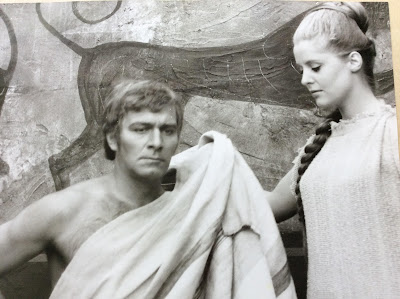Here we are again, at yet another edition
of the beloved - at least by me - series “Lost in Translation”. This time we
talk about one of the most cherished film genres, that produced movies that
made people laugh and forget their troubles. Many screwball masterpieces were
also a box-office failure when they were first exhibited, but they stood the
test of time and are now considered some of the best movies ever made by
critics, filmmakers and cinephiles.
One curious tidbit is that there is
no direct translation of “screwball comedy” in Portuguese. We either refer to
the original term or try an approximation - I usually say “zany” or “wacky”
comedies whe talking about screwball. Now let’s see some fun titles in
Brazilian Portuguese:
“Bombshell” (1933) received the
title “Mademoiselle Dynamite” (“Mademoiselle Dinamite”)
“The Thin Man” (1934) is here “The
Accused’s Supper” (“A Ceia dos Acusados”)
“Mr Deeds Goes to Town” (1936) got
the title “The Dashing Mr Deeds” (“O Galante Mr Deeds”)
“My Man Godfrey” (1936) became “Irene,
the Stubborn” (“Irene, a Teimosa”)
“Libeled Lady” (1936) is here “Married
to my Fiancée” (“Casado com Minha Noiva”)
“Easy Living” (1937) received the
title “Lucky Girl” (“Garota de Sorte”)
“The Awful Truth” (1937) is known as
“Cupid is a Stubborn Brat” (“Cupido é Moleque Teimoso”)
“Bringing Up Baby” (1938) received
the title “Mischievous” (“Levada da Breca” is a hard-to-translate slang)
“You Can’t Take It with You” (1938)
was translated as “From the World You Take Nothing” (“Do Mundo Nada se Leva”)
“The Philadelphia Story” (1940) got
the title “Wedding of Scandal” (“Núpcias de Escândalo”)
“His Girl Friday” (1940) is known as
“Fasting of Love” (“Jejum de Amor”)
“The Lady Eve” (1941) became “The
Three Nights of Eve” (“As Três Noites de Eva”)
“Sullivan’s Travels” (1941) received
the title “Human Contrasts” (“Contrastes Humanos”)
“The Palm Beach Story” (1942) is
known as “A Real Woman” (“Mulher de Verdade”)
“The Man who Came to Dinner” (1942)
received the title “Satan Dines with Us” (“Satã Janta Conosco”)
“The More the Merrier” (1943) is
here “Original Sin” (“Original Pecado”)
“Arsenic and Old Lace” (1944) became
“This World is a Loony House” (“Este Mundo é um Hospício”)
“Christmas in Connecticut” (1945)
got the title “Indiscretion” (“Indiscrição”)






.jpg)




